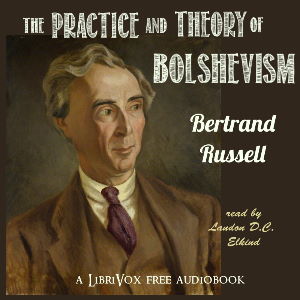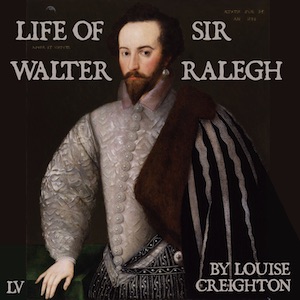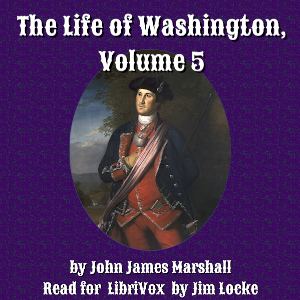This book records Bertrand Russell's impressions of the new regime after a 1920 visit to Russia following the 1917 Bolshevik Revolution, including his meetings with Lenin, Trostky, and Gorky. It includes a chapter that was authored by Dora Black, educational theorist and feminist author, and Russell's spouse. This chapter was unfortunately removed in the second edition, which was issued after Dora and Bertrand divorced. This recording is dedicated to my darling wife, Jill. Happy Hanukkah and Happy 2020! - Summary by Landon D. C. Elkind
17 episodes
In 1906, William Jennings Bryan, himself a famous American orator, and Francis Whiting Halsey published a series of the most famous orations of all time. They are ordered by both geographic area and time period, ranging from Ancient Greece to their contemporary United States. The third, fourth, and fifth volumes of this collection concern British speakers. The speeches contained in this fifth volume are ordered chronologically. We begin in the year 1865 with a speech on the Canadian Confederation, and end this volume in 1906, the year in which this volume was published, with a couple of speeches on Liberalism. - Summary by Carolin
20 episodes
Sir Walter Ralegh (c. 1552-1618), English soldier, explorer, courtier, writer, and poet was one of the most notable figures of the Elizabethan era. Louise Creighton's short biography follows him from the wars in Spain to the jungles of Guiana. Ralegh sparkles in a court riddled with intrigue and constrained by attendance on the brilliant, imperious Elizabeth and on her successor, that rigid mediocrity, James. During his long confinement in the Tower of London, Ralegh conducted chemical experiments and wrote a ''History of the World.'' Everyone knows that things did not end well for Sir Walter, but time has not tarnished the charisma of his life. Creighton writes, ''There was no field of activity then open to men into which he did not enter...In an age remarkable for its varied forms of intellectual vigour, he represents with wonderful many-sidedness the different interests which then absorbed men's minds.'' (Pamela Nagami, M.D.)
28 episodes

As an observer at the WASHINGTON CONFERENCE FOR THE LIMITATION OF ARMAMENTS held in 1921 and attended by the victorious nations of The Great War, the acclaimed author H. G. Wells wrote 29 short essays that were serialized in the New York World and other newspapers. This book is a collection of those essays. They are not a record or description of the Conference, but the impressions of one visitor. Wells noted that the failed League of Nations was the first American initiative toward an organized world peace, and in its absence “the American mind has produced this second experiment, which has been tried with the loosest of constitutions and the most severely defined and limited of aims. Instead of a world constitution we have had a world conversation.”
The essays relate “one observer’s conviction of how things can be done, and of how they need to be done, if our civilization is indeed to be rescued from the dangers that encompass it and set again upon the path of progress.” While history would not bear out all of Wells’ various expressions of optimism and pessimism, his vision of world peace nevertheless remains relevant today. ( Lee Smalley)
29 episodes
The Wars of the Roses, 1377-1471, were a series of English civil wars fought for the control of the throne of England between two rival cadet branches of the House of Plantagenet, Lancaster and York. The Scottish historian, Robert Balmain Mowat (1883-1941) writes that these wars saw "the death of the old England and the beginning of the new." But they also saw the emergence of great personalities: the noble Richard of York, Warwick the Kingmaker, King Edward IV, indolent and energetic by turns, and his relentless opponent, Margaret of Anjou, a true she-wolf of France. (Summary by Pamela Nagami, M.D.)
33 episodes
Charles James Fox (1749-1806) was a prominent British Whig member of Parliament and the arch-rival of William Pitt the Younger. A staunch opponent of George III, he supported the American colonists throughout the War of Independence. He was a leading parliamentary advocate of religious tolerance, individual liberty, and the anti-slavery cause. A notorious gambler and womanizer, Fox fell in love with and married Elizabeth Armistead, the former mistress of the Prince of Wales, and found happiness and tranquility in their home, St. Anne's Hill. He was most famous for his oratory, of which Wakeman writes that in "the whole range of Fox's speeches there is not to be found a mean thought or an affectation...The very openness and complete absence of reserve, with which he poured out his whole heart to his audience took them by storm." (Pamela Nagami, M.D.)
21 episodes
John Churchill, 1st Duke of Marlborough (1650-1722), was the oldest surviving son of Sir Winston Churchill, an impoverished country gentleman. After the restoration of Charles II, John's sister, Arabella, became the mistress of the King's brother, James, Duke of York. The family fortunes were made and Churchill's military career launched. In the winter of 1677-78, Churchill married Sarah Jennings, the intimate friend of the future Queen Anne. Ruthlessly changing sides during the Glorious Revolution, he deserted his patron James and joined the army of William of Orange. Marlborough's brilliant generalship in the War of the Spanish Succession destroyed the myth of French military invincibility and won him the adoration of the British people. But Marlborough fell from power when his wife's relationship with Queen Anne ended rancorously and when the peace-loving Tories ousted his wartime supporters, the Whigs. - Summary by Pamela Nagami, M.D.
39 episodes
This book presents a summary of the findings conducted by the the Juvenile Protective Association in Chicago before the changes brought on by the war-time economy. The study's researchers were A. P. Drucker, Sophia Boaz, A. L. Harris, and Miriam Schaffner. Its author, Louise DeKoven Bowen was a well-known philanthropist and suffragist in Chicago. The summary makes no strong argument on its own, but presents simple facts and observations that would alert the reader to the need for social and economic reform in the city. - Summary by KevinS
3 episodes

In this short book Edward Ellis Morris writes a vivid account of the reigns of the first two Georges. Scarcely had the fifty-four-year-old king assumed the throne when James Stuart roused the Highlanders in the "Fifteen." Five years later the collapse of the South Sea Company convulsed Britain and her first prime minister, Robert Walpole, emerged to stabilize the country's finances. George II succeeded his father in 1727 and Morris writes that "the new King was in person short, and like many short men, proud and touchy." Fortunately, he was guided by the wise Queen Caroline. On the Continent, the Turks besieged Vienna, Britain got embroiled first in the War of Jenkins' Ear and then in the War of the Austrian Succession, while Bonnie Prince Charlie took advantage of these distractions to mount the nearly successful Jacobite invasion of the "Forty-five." Meanwhile, John Wesley's Methodism revived religious enthusiasm, Boswell immortalized Samuel Johnson and his friends, and Tom Jones embarked on an epic road trip in which Henry Fielding brought English society to life, warts and all. - Summary by Pamela Nagami, M.D.
34 episodes
Bernard Mandeville's didactic poem praising the virtues that personal vices bestow on society as a whole, along with several treatises and dialogues explaining and defending it. Mandeville's theories were influential in the development of both the moral philosophy of the Scottish Enlightenment and the methodology of modern economics. - Summary by Matthew Muñoz
48 episodes
Excerpt: At the time when Mr. Cleveland was inaugurated there had been no Democratic President for a full quarter of a century. A whole generation had been born and had grown to manhood and to womanhood without ever having lived under any but Republican rule. This long continuance in power of a single party had led many citizens to identify the interest of that party with the interests of the nation. The democrats had been so invariably beaten at the polls as to make Republicans believe that the defeated party had no decent reason for existence, and that is was composed only of wilful obstructionists or of persons destitute of patriotism.
Note: Footnotes will not be read but will be indicated along with page numbers which can be found at
https://archive.org/details/20yrstherepublic00peckrich/page/n8/mode/2up - Summary by Celine Major
41 episodes
"The law perverted! The law—and, in its wake, all the collective forces of the nation. The law, I say, not only diverted from its proper direction, but made to pursue one entirely contrary! The law becomes the tool of every kind of avarice, instead of being its check! The law guilty of that very inequity which it was its mission to punish! Truly, this is a serious fact, if it exists, and one to which I feel bound to call the attention of my fellow-citizens." —Frédéric Bastiat
10 episodes
This fourth volume covers the final battles and the peace conditions of the war, Washington at home, Washington as first President, and the internal battles to hammer out a new and heretofore unseen government.
21 episodes

“O Abolicionismo” é uma das obras mais importantes para a abolição da escravatura, no Brasil. Ela propõe, como tarefa imediata para a época, a emancipação dos escravos e seus filhos, bem como a tarefa da anulação dos efeitos de um regime que por três séculos criou e alimentou situações que destroçaram o espírito de Justiça e Humanidade. Ou seja, esta obra de Joaquim Nabuco, abolicionista, monarquista, jurista, historiador, diplomata, poeta e jornalista brasileiro, foi escrita e publicada em 1883 e pregava o fim da situação do negro no Brasil de então. Pregava também que eram necessárias ações, para evitar a perpetuação do desrespeito ao ser humano vindo da África como escravo, que tinha fossilizado nos três séculos anteriores. A situação do negro brasileiro, nesta segunda década do século XXI, indica ser realidade o que Nabuco temia no século XIX – uma situação perpetuada. Esta frase de “O Abolicionismo” dá a medida do livro: “A história da escravidão africana na América é um abismo de degradação e miséria que não se pode sondar, e infelizmente essa é a história do crescimento do Brasil”. “O Abolicionismo”, em sua essência, foi escrito também para o Brasil de hoje. (Sumário por Rachel Moraes)
18 episodes
Volume five of John Marshall's biography follows Washington through his second term ending in the election of John Adams and Washington's retirement to Mount Vernon. This narrative continues the careful and intriguing analysis of the subjects of the previous volume as America navagtes with Washington's wise captaincy the complicated and sometimes violent foreign and domestic conflicts of the young, developing nation.
15 episodes














